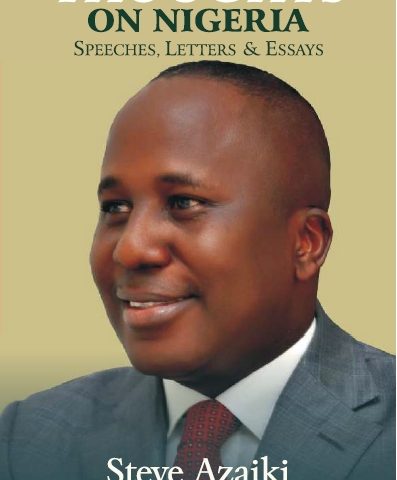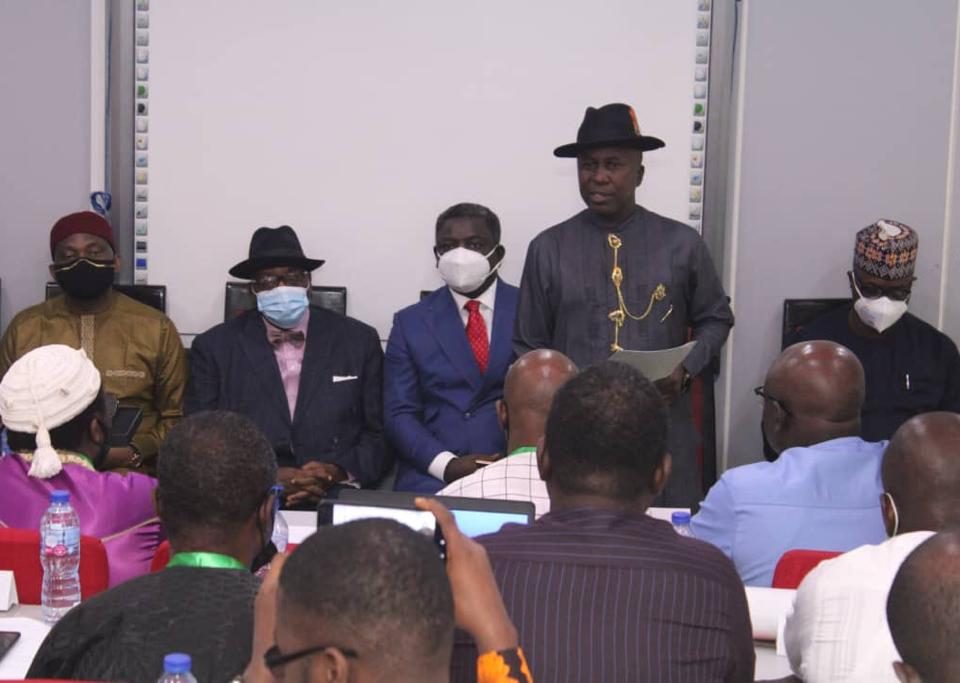
HANDOVER NOTES; BUHARI MUST TAKE PERSONAL INTEREST IN THE CONTENT
June 15, 2015
Ramadan Mubarak
June 18, 2015The babble of voices on the socio-political space sometimes makes it difficult to sift through properly and winnow out the best and practicable views that best suit Nigeria’s intractable problems.
This is further compounded by policymakers who fit World Bank and International Monetary Fund-induced solutions to every situation and circumstance in far removed and alien soil like Nigeria. Prof. Steve Azaiki’s Thoughts on Nigeria: Speeches, Letters and Essays (Associated Book-makers Nigeria Ltd, 2014) falls into the category of seminal distillations that are often ignored by Nigeria’s policymakers at the peril of development.
It’s why, in spite of abundance of intellectual input to socio-political conundrums, the problems still persist, perhaps, that way, too, those who profit from the problems continue to feed fat on the misery of the majority.
The saying ‘do not judge a book by its cover’ is also true for Azaiki’s book. The author’s photograph on the cover, on a book that is not an autobiography, wrongly sets it out as one of those ego-massaging, self-glorifying tomes by Nigeria’s politicians likely to gather dust in private libraries soon after the fanfare of a launch. But Azaiki is no ordinary politician; he’s an academic that brings a whole measure of intellectual savvy to the governance table. Having served as Secretary to the State Government under Governor Diepreye Alamieyeseigha in Bayelsa State, Azaiki is eminently in a position to make qualified pronouncements regarding Nigeria’s leadership problems and offer modest suggestions on the way forward. But also, questions of his stewardship will also be asked: Is he speaking from hindsight of what might have been done? What did he and the government he served do to resolve some of these problems he is now exposing? Having also served during former President Goodluck Jonathan’s tenure as deputy governor, couldn’t he have put in a word or two to help stem the drift that assailed the country’s recently political history, especially the reverses that he contends National Economic Empowerment and Development Strategy (NEEDS) represent for the people of the Niger Delta and other low income, excluded areas?
These are some of the observable issues that arise from Azaiki’s postulations in his seminally researched essays and speeches that have the endorsement of former President Shehu Shagari, who wrote the forward to the book. These essays and speeches are clearly beyond the drill of some of the workaday run of politicians striding the land. Indeed, Azaiki is probably not writing for now, when democracy equals how much a politician can grab for his pocket while the majority wallows in abject poverty. This is why the emergence of an a properly educated crop of Nigerians that understand what development means and how it can be deployed to best serve the interests of segments of the Nigerians in their diverse sociological backgrounds is an imperative for the author. This postulation is at the heart of Azaiki’s Thoughts on Nigeria.
The book is divided into four parts although the themes or topics necessarily dovetail into one another, with a concern for the peculiar problems of minority Niger Delta inexorably confounded by oil politics. The first part is ‘On Governance and Politics’, with a telling first chapter on oil and gas and the leadership opportunity available for Nigeria. Sadly, Nigeria has repeatedly failed to cash in on such opportunities at the global level because the country fails to address inequities at home, what with the criminal neglect of oil-bearing communities both by the federal Government and the oil companies. The same neglect, Azaiki argues, attends Nigeria’s inability to diversify the economy with revenues from oil wealth, with the result that unemployment remains unacceptably high. The oil companies have their head offices in Lagos, a situation that necessarily denies Niger Delta youth employment opportunities in the oil exploited on their land.
According to the author, “We, as a major oil exporting nation, must use our oil to diversify exports and invest the bonanza in better roads and seaports, invest in education, manpower training, technology transfer and health services… We as a nation must address inequities in Nigerian politics. Oloibiri in Bayelsa State, where oil was first discovered in 1956-1958 must be indelibly etched within Nigeria’s consciousness, and not left barren as an after-thought of yesteryears”.
This essay was written during the Olusegun Obasanjo era. But clearly neither Obasanjo nor Jonathan heeded this sound advice. Even the road to Obasanjo’s Ota or the East-West Road to Jonathan’s Bayelsa was made during their tenures. The seaports of Warri, Port Harcourt, Calabar and Onne remain ghost ports under Jonathan. There’s, therefore, disconnect in scholarly postulations or advice and the realities of development in the land, a situation that has hobbled and stunted the country’s growth.
Azaiki’s is a man of patriotic fervour; for him, being in government is not the only way to serve his fatherland. Having left office, he set up the National Think Tank of like-minded Nigerians to help formulate policies for governments both at state and federal levels. In setting up the National Think Tank, Azaiki argues, “Given our political and economic antecedents and status in the comity of developing nations, we believe that the time has come for Nigeria to take its rightful position in world affairs. As one of the fastest growing, developing nations, Nigeria is expected to show leadership in the delivery of public service. We have, therefore, found it highly important that, in order to achieve good public governance, several factors come to play. Bearing these in mind, this Think Tank will provide a basis for analyzing the areas of success or failures of public governance in Nigeria and proffer credible solutions to the country’s myriad of socio-economic and political problems…”
The professor of Agriculture also writes on other issues of development and governance, especially as happened in recent collective memory. Such issues as Boko Haram, rash of impeachments, the sort that saw his former boss, Alamieyeseigha out of office in what he describes as strange circumstances akin to political witch-hunting, corruption, Bayelsa State under Sen. Seriake Dickson and a host of others.
‘On Niger Delta’ makes up part two of Azaiki’s Thoughts on Nigeria in which he devotes a lot of intellectual energy on issues plaguing the region that effectively feeds Nigeria, but which still has nothing to show for this economic bleeding that leaves a region and its people in bewildering abject poverty. Here, Azaiki argues that government’s developmental efforts through such policy as NEEDS have done far worse to deepen poverty rather than alleviate it. Apart from the physical poverty charactersised by the inability of the people to live well, as a result of polluted waterways and farmlands that starve them of their livelihood, Azaiki also points out a more deadly kind of poverty – educational poverty, which he says will keep the region’s coming generation perpetually poor and in disadvantage with their peers from other parts of the country.
The author argues that the rash of privatization and commercialization of government’s utilities, including the all-important social service like education, has devalued education currently offered in public schools. As a result, government now fails to budget adequately for education, which is contracted out to the highest bidder. This shortfall in educational budgeting will mean that the poor, a condition in perpetuity among the marginalized majority of Niger Delta citizens, cannot afford quality education for their children, as the oil resources of the region go to finance educational projects in other parts of Nigerian. This leaves them in the throes of poorly equipped schools and trained teachers, as local and state governments increasingly find it hard to cater for the huge educational needs of the region. This approach, which the author calls macroeconomic management of development that does not take into account the peculiar needs of special areas that are already at a disadvantage for which the Niger Delta falls compounds the problems of the region. This is moreso when the region is denied full benefit of its oil wealth, a policy that excludes majority of the Niger Delta poor.
As Azaiki states, “Under this framework, government has a purely regulatory role as education at all levels is now a commodity. As a result, NEEDS has deeply impacted the right to free, equal, and high quality education thereby excluding some citizens from participating in growing the economy and denying them from being integrated in a meaningful way in the long-run… the narrow mechanism of NEEDS as inadequate for the scale of a problem which requires broad-based measures…”
With part three as ‘Tributes’ and part four is ‘On International/Contemporary Issues’ that are dear to the author’s heart, Azaiki’s book effectively plumbs the depths of some of the problems plaguing the country. This is a book for now and the future that will help direct the course of good governance that has been lacking in Nigeria’s democracy since 1999. With President Muhammadu Buhari’s ‘Change’ mantra and his promise to feed school children every day, the first step would be to rethink NEEDS and its anti-poor stance in commoditizing education in line with Azaiki’s conception. Clearly, Azaiki’s former boss, Jonathan missed the road on NEEDS with regard to the Niger Delta.
Indeed, governors in the region will do well to read this book and redirect their thinking caps for better performance. Azaiki’s intellect shines through in this commendable work of dispassionate political rendering.
Anote Ajeluorou on June 17, 2015


